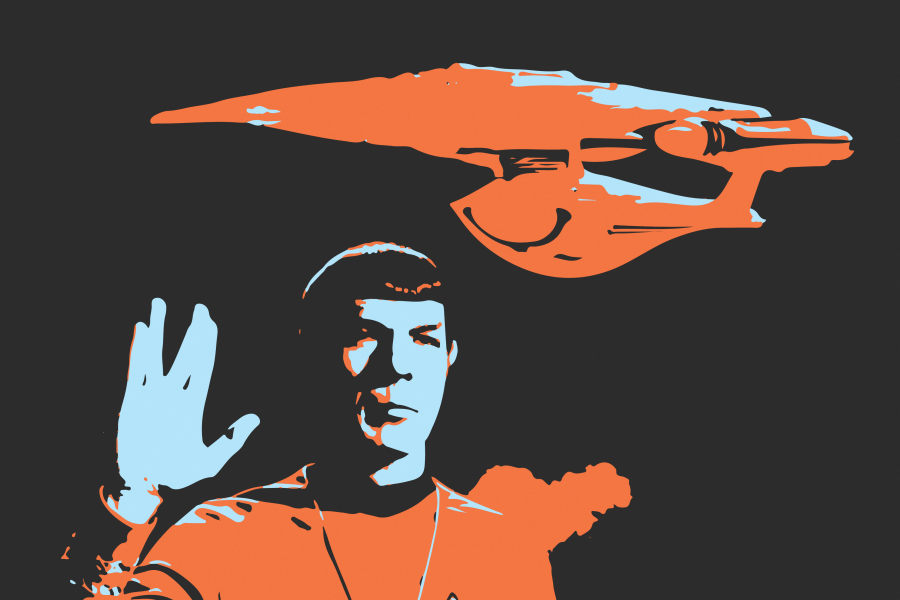
UC Davis students learn how fictional universe mirrors our own
For over 50 years, the science fiction franchise “Star Trek” has captivated millions of fans worldwide. And at UC Davis, you don’t have to travel across the universe to take a ride aboard the USS Enterprise. There’s a class for that.
Anthropology professor James Smith, a “Star Trek” fan himself, is the Captain of the ANT 191: Topics in Anthropology starship crew. The course title is “Star Trek as a Social Theory.”
“This course uses ‘Star Trek’ as a vehicle for understanding critical themes in social theory and anthropology, while also teaching students how to think about ‘popular culture,’ television, and daily life anthropologically,” Smith said.
Each week, students watch a single, 42-minute “Star Trek” episode in addition to assigned readings and in-class discussions analyzing social and anthropological theory. The series acts as a cultural map, mirroring the social constructions of one universe and comparing it to our own.
“It reflects the optimism of the Kennedy era in the U.S., and also presents an opportunity for us to question some of the assumptions informing that optimism,” Smith said.
Students examine questions like: Should there be a universal standard for making ethical decisions? Does technology make us “more human” or does it enslave us?
“I want students to think seriously and critically about what these imaginings of future entail so they can learn to understand some of the cultural assumptions that are packed into them,” Smith said.
Currently, the class is watching episodes from “Star Trek: The Original Series” and “Star Trek: The Next Generation,” but Smith says he may explore more of the franchise in the future.
On Dec. 4, the UC Davis Human Rights Lecture Series explored how “Star Trek” can be used as a tool for students to examine human rights-related topics. And now, for the first time at UC Davis, “Star Trek” has become the framework for an academic course.
Human Rights Studies Director Keith David Watenpaugh and Chancellor Gary May co-hosted the event at the Crocker Art Museum in Sacramento. The title of the series was “Star Trek/Human Rights: To Boldly Go to Human Rights for All.”
“Certainly in the 50 years since ‘Star Trek’ appeared, talking about, contesting, fighting, and dying for human rights has been a definitive element to being human,” Watenpaugh said.
The “Star Trek” franchise inspired May to pursue the sciences at a young age. With a background in electrical engineering and computer science, May did just that.
“I’m thrilled to hear about the new ‘Star Trek’ class and I hope to visit it, along with another class called the Science of Superheroes,” May said. “As many people know, I’m a ‘Star Trek’ fan — the original series — and one of the reasons I like it so much is because it deals with broader issues of the human condition: rights, race and ethics.”
As such, May jump-started a 10-year campus-wide initiative entitled, “To Boldly Go.” The plan seeks to increase UC Davis’ national ranking by strengthening the university’s research expertise and growing a diverse community that represents the demographics of California. A final plan is scheduled to completed this July.
May is also an aficionado of other superhero franchises like the “Avengers,” “X-Men” and “Justice League” because of their pursuits for good.
“I want students to feel empowered to be like superheroes — agents of their own success, their careers and their destinies — to do some good in the world,” May said.
The class will also explore the more specific themes of “Star Trek” such as politics, freedom, translation, empire, capitalism and more.
“The numerous episodes that responded to human right issues in the 1960s still resonate with us today, and also give us a sense of how people in that era were thinking about rights and also the timeless nature of human rights questions,” Watenpaugh said.
The end of the course entails a creative writing assignment in which students imagine that they are a part of a Klingon or Vulcan High Council. As a member of the council, the students must go revisit the year 2018 and write an ethnographic report on some aspect of the community from the lens of either a Klingon or Vulcan standpoint. The assignment gears students to explore the issues inherently constructed in our society.
“In the Star Trek world, this utopian future emerges after apocalyptic events in our current near future, so there is a message about the end of the world not in fact being the actual end, but rather the beginning of something else,” Smith said.
Written by: David Madey — science@theaggie.org





